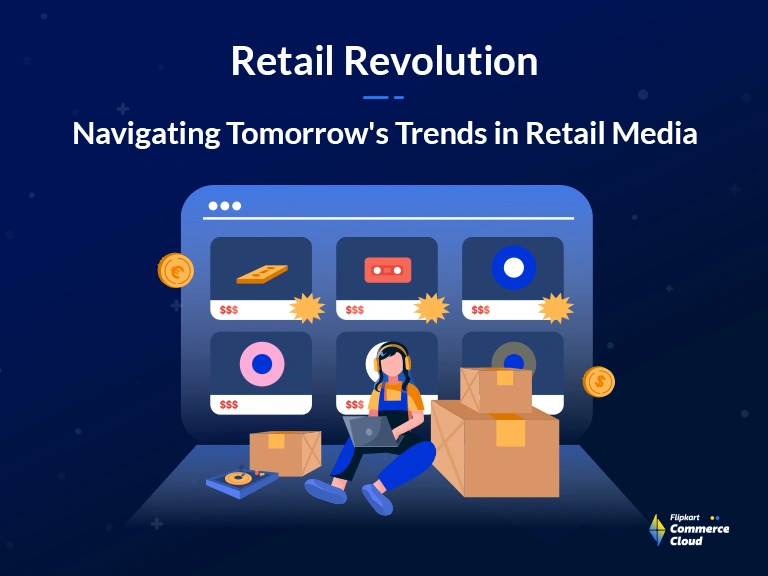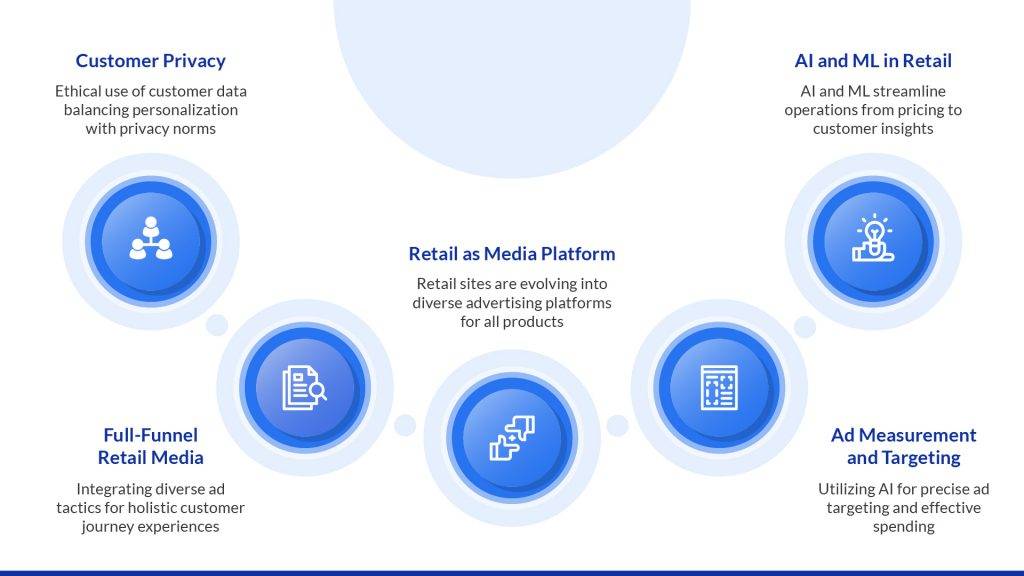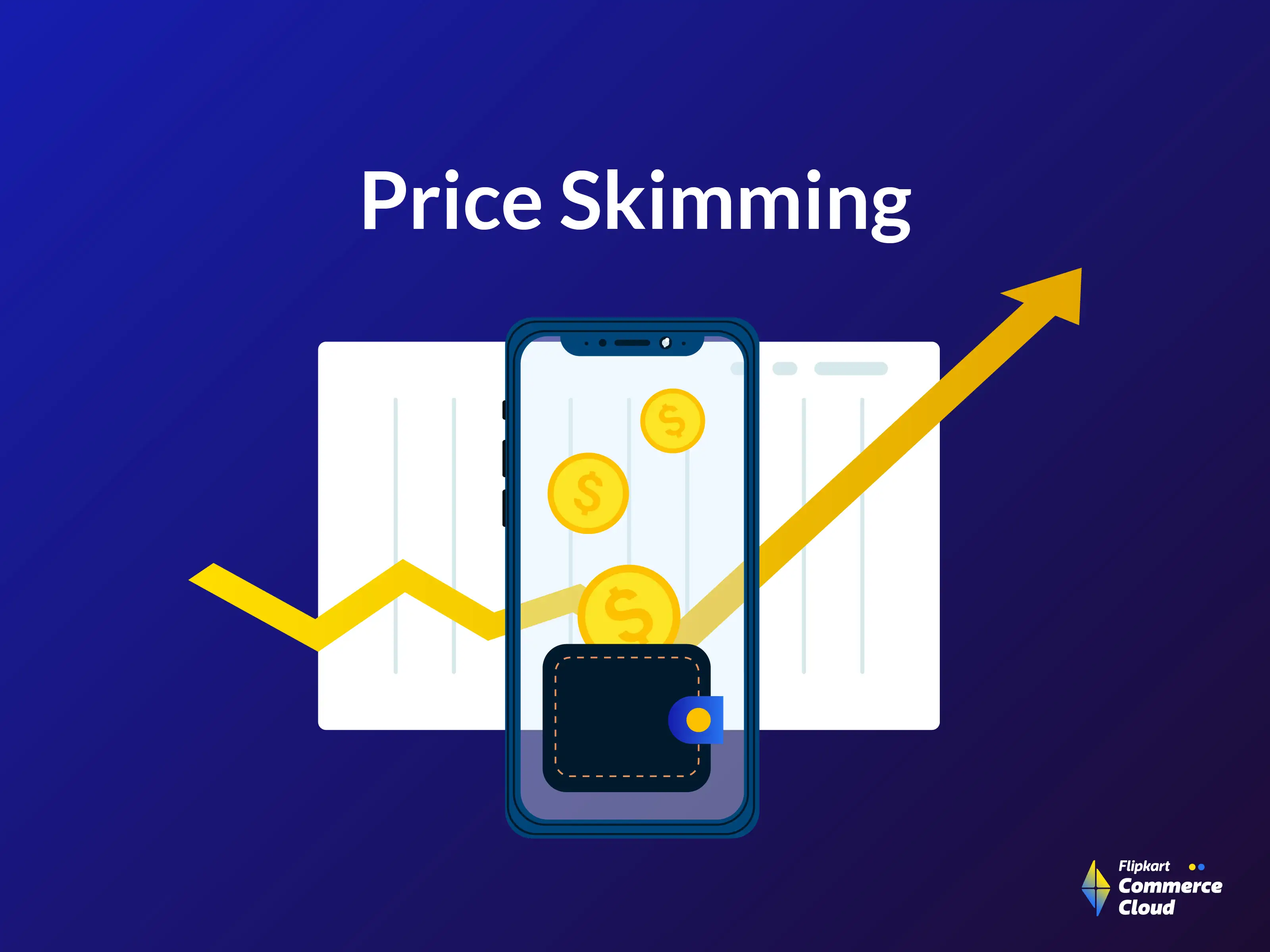
Retail Revolution: Navigating Tomorrow’s Trends in Retail Media
By Flipkart Commerce Cloud
Share On:
In the dynamic world of retail, a seismic shift is underway that is revolutionizing the industry in a way that nobody imagined. This transformation is not a temporary trend but is a significant move that has rendered traditional advertising as a thing of the past. According to the latest trends, the retail media market is expected to register an annual growth of 25% to achieve a total valuation of $100 billion by 2026. In fact, one of the key takeaways shared by experts is that it will account for almost 25% of total digital spending during this period.
The rise of retail media networks is being powered by a combination of impressive profit margins and the ability to offer personalized advertising solutions. Enterprises are transitioning to retail media not only because of better profitability but also to leverage first-party consumer data to deliver custom offers. As of 2023, the global retail media networks market has experienced notable growth. The market size increased from approximately $19.49 billion in 2022 to $20.81 billion in 2023, marking a compound annual growth rate (CAGR) of 6.8%.
Here are the top five retail trends that are likely to shape the industry’s pathway in the coming year:

Trend#1: Safeguarding Customer Trust in the Age of Retail Media
Retailers leverage first-party customer data to create personalized ads, striking a delicate balance between customization and privacy. While these targeted advertisements can drive profitability, it’s crucial for retailers to utilize their extensive data ethically without compromising consumer privacy. Gaining consumer trust depends on asking for only relevant information and minimizing data collection. This approach is particularly vital in the retail sector, where the value of personalized data holds considerable importance.
Laws around data privacy are getting stricter, and retailers need to comply with them. Non-compliance with data privacy laws can result in penalties, legal issues, and damage to reputation and consumer trust. The General Data Protection Regulation (GDPR) in Europe and the California Consumer Privacy Act (CCPA) in the United States are some of these laws.
Investing in technology like Consent Management Platforms (CMPs) and Preference Management Platforms (PMPs) is crucial for retailers. These tools help manage consent and preferences across digital and physical channels, ensuring compliance and building consumer trust. As per the retail media trends of 2024, enterprises need to stay ahead of evolving privacy laws and regulations in all regions to maintain a sustainable and compliant retail media offering.
Trend#2: Full-Funnel Retail Media: The New Frontier in Advertising
The latest retail media trends indicate that full-funnel retail media will be an important strategy for engaging customers and driving sales in the next year. It combines different types of media and advertising, including digital ads, to create a seamless customer journey from brand awareness to purchase.
Full-funnel marketing solutions address the limitations of on-site advertising through tools like Connected TV (CTV) and Social Media. They also do a good job of enabling these networks to secure the lion’s share of digital advertising budgets allocated to shopper marketing and digital retail.
Platforms like Amazon, Meta, and Pinterest are partnering to drive growth in social commerce. This collaboration enables better attribution and links conversions to mid- or upper-funnel ad spending while helping customers see more relevant and timely ads, improving their shopping experience.
For retailers venturing into full-funnel retail media, the primary focus should initially be on conversion metrics followed by a shift toward long-term KPIs like brand lift and recall. This shift aligns with changes in customer behavior and expectations, as more than 60 percent of consumers have tried new shopping behaviors during Covid, emphasizing the importance of a brand’s purpose.
Trend#3: The Evolution of Retailers into Media Powerhouses
As per retail media trends of 2024, retailers are redefining their role in the modern ecommerce environment. This is being achieved through the transformation of every retailer’s website or other apps into dynamic advertising platforms like Facebook, Google, and others. This step is making retailers prefer a media company, where they offer valuable advertising real estate on digital shelves to various brands. This strategy is not limited to products they stock; online retailers are expanding to include non-endemic advertising as well. Herein, retailers are leveraging their customer base and digital platforms to offer advertising solutions for products and services beyond their core business. This approach opens doors to diverse sectors such as travel, services, and other areas, enhancing their advertising revenue and reaching new audiences.
By integrating advanced data analytics and targeting capabilities, these networks are offering highly efficient advertising solutions. Some of the prominent examples that deserve a mention here are Walmart Connect, Best Buy’s Retail Media, Amazon Advertising, Target’s Roundel, and Kroger Precision Marketing. The focus is on aligning advertising spending with these changing patterns and leveraging technology partners to improve their offerings. This becomes more important as cookies are phased out, offering brands a way to connect with their target audience effectively and respectfully regarding data privacy.
Trend#4: Advancing Ad Measurement and Targeting in Retail Media
You may be wondering why retail media has generated so much excitement in the modern retail ecosystem. Well, the fact is that retail media advertising offers a seamless blend of targeted advertising and a better shopping experience. Retail media platforms serve ads where the shopper is already engaged, making them highly relevant. The current retail media ecosystem revolves around retail ads, retail media networks, and advanced retail platforms, ensuring that ads are not just random but are aligned with the interests and behaviors of the users.
Retail advertisers are increasingly becoming conscious of their spending, focusing on maximizing the return on their advertising investments. It is one of the important retail media trends driving demand for the latest tech-driven solutions that offer enhanced personalization and audience targeting capabilities. This approach not only optimizes retail media spending but also improves the overall effectiveness of their advertising campaigns. Thus leading to better engagement and conversion rates.
A key player in this transition is Flipkart Commerce Cloud (FCC), offering a range of tools to improve ad attribution and place contextually targeted ads. FCC’s advertising technology is designed to monetize every customer visit, increasing engagement with brands and driving conversions. It offers a comprehensive suite of ad formats, including display ads, product contextual ads, and product listing ads. These tools help retailers monetize their online activities effectively and unlock advanced ad-tech features to achieve better ROIs.
Trend#5: AI and ML: Revolutionizing Retail with Smart Decision-Making
Artificial Intelligence (AI) is transforming the retail sector by automating and optimizing different processes, which helps in creating a cycle of data evaluation and model improvement, leading to effective and targeted marketing strategies. Machine learning algorithms can automate and improve pricing through extensive data analysis, considering factors like brand, historical sales data, and previous pricing decisions. This reduces human errors, speeds up the pricing process, and helps maximize profit margins and overall net revenue.
AI technologies have also been crucial in predicting demand, ensuring that enough quantities are in stock as per the estimated needs. This functionality improves inventory planning and leads to better customer satisfaction. Machine learning is also used to group customers based on past behavior and interests, helping to offer personalized digital marketing services. Despite its immense potential, the retail media trend of rapid AI and ML adoption comes with several challenges and concerns. Retail leaders are worried about the risks linked with AI, such as cybersecurity issues and potential biases in AI algorithms. But with over 78% of companies having an AI code of ethics, responsible and ethical use of AI technologies is gaining momentum. This approach ensures that AI adoption aligns with core values and business objectives, mitigating risks while leveraging the benefits of retail media advertising.
Navigating the Digital Transformation with Flipkart Commerce Cloud
As per the current retail media trends, generation Alpha, despite their young age, is making a noticeable impact on the retail industry. Born between the 2010s and 2020s, they are growing up in a world where technology is not just a tool but a crucial part of their daily lives. As a tech-savvy generation, they are having a significant impact on family purchasing decisions. This holds, particularly in areas like toys and educational materials, where their opinions are leading to growth in popularity for certain brands or products.
A remarkable aspect of Generation Alpha’s influence is its push for inclusivity and sustainability in retail. As a result, we are seeing brands and retailers moving away from traditional gender categories and instead opting for gender-neutral product lines in online marketplaces as well as physical stores. This generation also shows a strong commitment to sustainable practices, which is evident from their support for brands that give priority to environmental responsibility; for instance, toy or apparel brands focusing on recyclability.
In this evolving retail scenario, tools like FCC’s pricing engine are crucial. These solutions enable retailers to adapt to the evolving preferences of this generation. FCC’s advanced pricing capabilities can help retailers optimize their pricing strategies in real time to ensure competitiveness and relevance in a market driven by younger consumers.
The influence of Generation Alpha is leading to a future where the lines between online and offline shopping will blur. It will help with creating a highly integrated omnichannel retail environment. This generation considers technology as a medium to engage and make a difference in the world. Retailers must understand this shift and transform their strategies to fulfill the expectations of this important consumer demographic.
Retail Media Trends: What Lies Ahead?
As the retail media space continues its transition, retailers and digital marketers need to stay informed and adapt to these changes. The integration of advanced technologies like FCC’s unified retail media solution holds the key in this journey.
Generation Alpha’s emphasis on technology, inclusivity, and sustainability presents both challenges and opportunities for the retail sector. By embracing these changes and investing in the right tech solutions from the FCC, retailers can maintain their relevance in a market that is being shaped by the youngest generation. Sign-up for FCC here!
More Blogs
See how retailers and brands are winning with FCC

What is a High-Low Pricing Strategy?
Read More
Ultimate Guide To Dynamic Pricing Strategy In 2025
Read More
Retail Pricing Strategies: Winning with Promotion Pricing in Competitive Markets
Read More
Ad Tags: Enhancing Ad Serving Efficiency in Large-Scale Campaigns
Read More
Everything About Price Skimming Strategy Explained
Read More
What is a High-Low Pricing Strategy?
Read More
Ultimate Guide To Dynamic Pricing Strategy In 2025
Read More
Retail Pricing Strategies: Winning with Promotion Pricing in Competitive Markets
Read More
Ad Tags: Enhancing Ad Serving Efficiency in Large-Scale Campaigns
Read More
Everything About Price Skimming Strategy Explained
Read More
What is a High-Low Pricing Strategy?
Read More
Ultimate Guide To Dynamic Pricing Strategy In 2025
Read More
Retail Pricing Strategies: Winning with Promotion Pricing in Competitive Markets
Read More
Ad Tags: Enhancing Ad Serving Efficiency in Large-Scale Campaigns
Read More